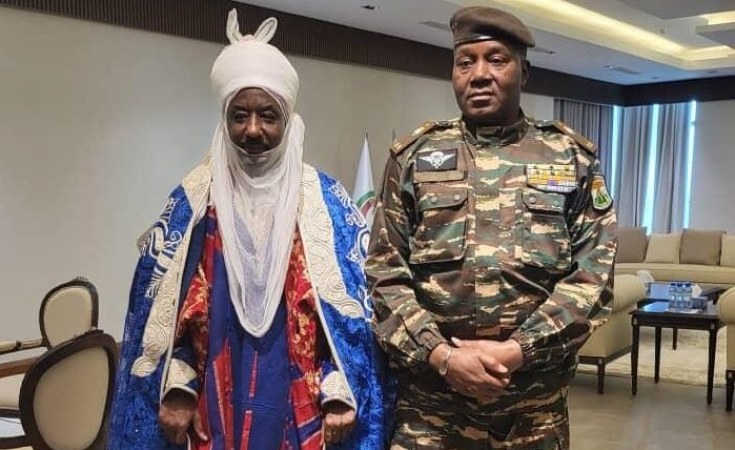The African Union, the West African bloc ECOWAS and the UN had planned a joint diplomatic mission to Niamey. Nigerian President Bola Tinubu says diplomacy is "the way forward," but didn't rule out military intervention.
Niger's junta has denied access to a proposed diplomatic mission, an African Union spokesperson confirmed on Tuesday.
The West African country's military rulers took power in a coup late last month.
The proposed mission was to be carried out jointly by the West African bloc (ECOWAS), the African Union and the UN.
This comes as the West African bloc is set to hold a meeting on Thursday to discuss a response to Niger's defiance to its ultimatum, which ECOWAS had set for the reinstating of ousted President Mohamed Bazoum.
Last week, ECOWAS defense chiefs agreed on a possible military action plan if Bazoum was not released and reinstated. But they said any operational decisions would be taken by heads of states.
ECOWAS spokesperson Emus Lungu said the heads of state would participate in the Thursday summit in the Nigerian capital of Abuja, where ECOWAS is headquartered.
The Nigerien coup leaders announced on Sunday the closing of the country's airspace because of the "threat of intervention" as the ultimatum expired.
Nigeria doesn't rule out military intervention, US 'realistic' on diplomacy
Nigerian President Bola Tinubu said that ECOWAS had not ruled out military intervention in Niger, even if diplomacy is the "best way forward."
"No options have been taken off of the table," he said.
Tinubu ordered new financial sanctions on Niger through Nigeria's central bank, targeting entities and individuals involved in the coup, his spokesman Ajuri Ngelale said.
The US State Department said that it had "realistic" expectations on reversing the coup.
"We do still have hope, but we are also very realistic," State Department spokesman Matthew Miller said.
"We do have hope that the situation will be reversed but at the same time, we are making clear, including in direct conversations with junta leaders themselves, what the consequences are for failing to return to constitutional order," he said.
"We're going to keep trying, again fully recognizing how difficult that path is."
UN warns of lack of humanitarian assistance
The UN's humanitarian chief in Niger, Louise Aubin, told the Reuters news agency that Niger's military coup is hampering humanitarian efforts in the West African country.
"The risk is that we start running out of assistance materials to be able to help out people -- I'm talking about simple things that are so life-saving," Aubin said, adding that UN agencies had planned on supporting 4.3 million people through emergency humanitarian assistance.
She listed food, vaccines and cash as areas of concern.
Aubin said that UN humanitarian flights had been disrupted by the junta's decision to close Niger's airspace.
"There are no flights coming in at the moment. So that is becoming an issue," she said. "Being able to mobilize food means obviously being able to bring in food from the outside."
France seeks restoration of democracy
AFP news agency cited an unnamed diplomatic source as saying that France stands by its policy of supporting efforts to "restore democracy" in Niger.
AFP cited the source as saying that French President Emmanuel Macron believes it is up to ECOWAS "to take a decision on how to restore the constitutional order in Niger, whatever that decision may be."
"Like all our partners, we fully support the regional countries' efforts to restore democracy in Niger," the source added.
French Foreign Minister Catherine Colonna said that Bazoum and his deposed government was "Niger's only legitimate authorities." She said that Paris was supporting ECOWAS efforts to undo the coup in Niger "with force and determination.
Diplomacy is 'preferred'
Niger junta's defiance of the ECOWAS ultimatum triggered a choir of calls for diplomacy, especially with several western countries having troops in Niger as part of the fight against Islamist militant insurgency in the region.
"There's no doubt that diplomacy is the preferred way to resolve this situation," US Secretary of State Antony Blinken told French radio station RFI on Tuesday.
"It is ECOWAS' current approach. It is our approach," he added.
Blinken said Washington was backing ECOWAS leaders in holding a summit on Thursday to discuss the situation.
On Monday, acting US Deputy Secretary of State Victoria Nuland said she met with the coup leaders in Niger but they did not allow her to see Bazoum.
Nuland said the talks were "extremely frank and at times quite difficult because, again, we are pushing for a negotiated solution."
"It was not easy to get traction there. They are quite firm in their view of how they want to proceed," Nuland told reporters on a call from Niamey.
How did Niger junta respond to ECOWAS ultimatum?
General Abdourahamane, who declared himself the leader after the coup, continued moving to consolidate power by appointing military insiders to key government positions.
On Sunday, the junta organized large shows of support in Niamey in the run-up to the ECOWAS deadline expiration, with military officials greeting the crowds in a venue draped in Russian flags and decorated with portraits of the generals.
The junta said it was closing Niger's airspace "for all aircraft until further notice" as of Sunday, as a council of coup generals said it had seen signs of "pre-deployment in preparation for intervention" by two Central African countries it did not name.
The junta's top allies, Mali and Burkina Faso, where the military also took power by force in 2020 and 2022, said they were sending a joint official delegation in a show of solidarity with Niger on Monday.
fb,sdi/wmr,wd (AP, AFP, Reuters, dpa)


